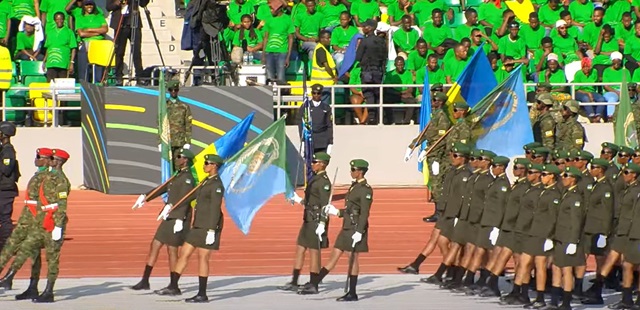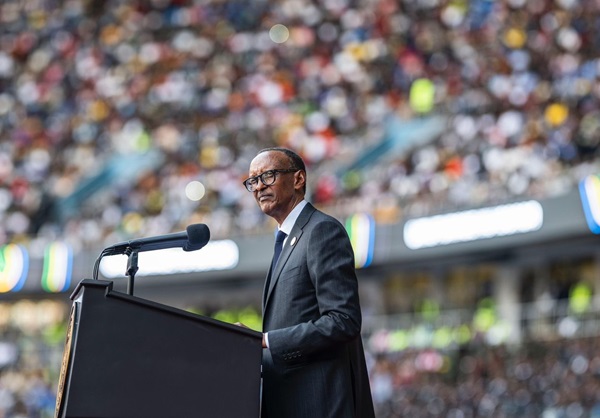
What the inauguration of Kagame for another term told about the Rwanda he is building
THE LAST WORD | Andrew M. Mwenda | And so it was that on August 11 we were in Kigali for President Paul Kagame’s inauguration.
It happened that a well-known Rwandan with Ugandan roots hosted a wedding of his son in Kigali the previous day. It attracted a large contingent of Ugandan elites from Kampala. Some of them had never been to Rwanda; many had not visited the country in 20 years. A few of these Ugandan visitors used to be rabid Kagame critics. They used to tout me for being “in bed” with a “murderous dictator”. They had a deep-seated animosity towards the Rwandan president personally and terribly distorted views of post genocide Rwanda.
So, it was thrilling for me to meet them in Kigali. Without exception, all of them were transformed by the reality they saw. It contradicted the deeply entrenched prejudices and biases they have about the country and its president. I listened in silent admiration as they told me the wonders they saw as they drove around Kigali, visited friends and sites and ate and drunk in restaurants and bars. But the thing that had the greatest impression of them was meeting Kagame personally when the president hosted them. They realised he is a very different man from the one they used to imagine. So, they talked, ate and drunk and took selfies with him in a relaxed way. It was classic road to Damascus as all the Sauls turned into Pauls.
This brings me back to Brand Rwanda. The inauguration took place at the now refurbished 45,000-seater Amahoro Stadium. You could summarize the country Kagame has built right there. From the carpet used to cover (protect) the grass in the stadium and the way the words on it were written, to the immaculate lines of the Rwandan army and police, the new Rwanda was visible to all. The soldiers and police on parade were smartly clad in brand new uniforms, marching in step with precision as the crowd of Rwandan citizens in the stadium cheered them in loud admiration. Then the pretty young lady-ushers receiving and sitting guests and the security guys with their earpieces; all of them dressed and looked in a specific way, almost choreographed to project a particular image of this reborn nation.

That is Brand Rwanda; the image of the country that hits you from the time you land at the airport, it follows you as you drive to your hotel, up to the last place you visit. The road from the airport is clean, and in the middle is a boulevard. This has well lined palm trees and pruned flowers designed to reflect calm, beauty and elegance. On the side of the street is a pedestrian sidewalk and beyond it a retaining wall (Kigali is hilly so streets cut through them). The pedestrian sidewalk is better than anything you find in London and Paris, and the retaining wall is designed with pots and flowers that contribute to the beauty and elegance around you.
As you drive, the police officer on the road is also clad in a starched uniform and polished boots, totally focused on his job and wearing an air of pride. The security barricades are manned by smartly dressed officers from the Republican Guard exhibiting confidence and yet are polite to all. By the road is a police patrol car: brand new, clean and clearly marked. Everywhere as you drive from the airport to your hotel, you are fed on a particular image of Rwanda that penetrates your mind: this is a country on the move: this is not the Africa of potholed roads, of broken or missing pedestrian sidewalks, of shabby potbellied policemen, poorly dressed soldiers looking idle and disorderly that you encounter in many an African city. This is a country whose leaders and people know where they are going.
Brand Rwanda is something Africa has not seen since independence. Not even Botswana and Mauritius, the most economically successful countries in Africa, have had such a branding project. Rwanda projects pride and exudes confidence – literally in every place you visit, in almost every Rwandan you meet. A police station in Rwanda will be well build and furnished. A school will be clean with pupils in uniform. A hospital will also reflect this sense of what Rwanda is, or how Rwanda sees itself and wants others to see it. Even the way Kagame, his ministers and other officials of the government of Rwanda dress is choreographed, even without enforcing it, to reflect the country aspiring to touch the sky.
To capture this physical aspect of Rwanda is to understand the nationbuilding project behind it; the kind of ideological orientation Kagame and his RPF have been conducting in this country. They have been pressing it in the minds of Rwandans to believe “ndi’omunyarwanda, ndafitte agaciro.” (“I am a munyarwanda, I have dignity.”) This message has sunk in the social consciousness of all Rwandans. Everyone in Rwanda sees himself or herself as a special person with honour and dignity. To be Rwandan is to feel proud of your identity and of your country. And you must conduct yourself in a particular way: dress well, be clean, carry yourself with pride and confidence. Therefore, your home and your neighborhood should reflect this self-image which is then reflected in every aspect of national life in this country.
Thus, the army and police on parade reflect the Rwanda Kagame is building. When the special forces did a march in the stadium, dressed in meticulous uniforms, with helmets and night vision cameras on their heads, brandishing assault weapons, they radiated pride. Rwandans in the stadium cheered them because they reflected what Rwanda is or should be. So effective has this project of branding Rwanda become that kids of the rich in this country compete to join the armed forces. Many Rwandans in the diaspora in wellpaying jobs send their children to join the army. This is contrary to many countries, most especially the richest one in the world, the USA, where mostly children from poor families join the army.
Commentators on Rwanda miss this great success story; the story of inculcating in the minds of all citizens this sense of pride, of purpose and of a vision of the country they want to see, but one which they must live today. We want to be a great and rich nation, the slogan seems to say. So, we must live and conduct ourselves as a rich and great people now. Congs PK.
*****

amwenda@ugindependent.co.ug
 The Independent Uganda: You get the Truth we Pay the Price
The Independent Uganda: You get the Truth we Pay the Price






Welcome back to Rwanda Andrew. You will furnish us with Rwanda many times as before until you stopped going to Rwanda and writing about it. As for Muhoozi, watch out. Because he is not wise and has Museveni’s guns and money, going by his low level of reasoning, he will ‘dream’ and arrest or kill some relatively smart people around him like you over any small disagreement.. That is what happens with such kind of lunatic
The irony, many Banyarwanda in uganda don’t want to go back home. Iam wondering why are they not interested in the utopia you are talking about. It perturbs my mind why would some one continue staying in the ugandan dystopia when life in Rwanda is so good.
Mwenda is talking or writing about what he has seen. But beneath all this is a hidden agenda of torture, imprisonment and absolute neglect of human rights. One could easily compare what Mwenda has written about Rwanda, with North Korea. It also has clean roads, well dressed police officers and army, but what lacks beneath is scaring. So, the rwandese in uganda might be knowing a thing or two about their “Rwanda” that we dont know.
Mwenda clearly remains smitten by things Rwandan! Contrast the two emperors; one transitted generally with tree leaves from Luwero, while the other carried the whip into Kigali.